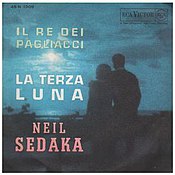
Neil Sedaka is an American singer, songwriter and pianist. Since his music career began in 1957, he has sold millions of records worldwide and has written or co-written over 500 songs for himself and other artists, collaborating mostly with lyricists Howard "Howie" Greenfield and Phil Cody.
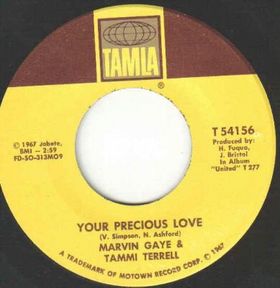
"Your Precious Love" is a popular song that was a 1967 hit for Motown singers Marvin Gaye and Tammi Terrell. The song was written by Nickolas Ashford and Valerie Simpson, and produced by Harvey Fuqua and Johnny Bristol. The doo-wop styled recording features background vocals by Fuqua, Gaye, Terrell and Bristol, and instrumentals by The Funk Brothers with the Detroit Symphony Orchestra. The song peaked at #5 on Billboard Pop Singles chart, #2 on Billboard's R&B Singles chart, and the top 40 on Billboard's Easy Listening survey. The song was later sampled by Gerald Levert on the song, "Your Smile", on his 2002 album, The G Spot.

"Happy Birthday Sweet Sixteen" is a pop song released in 1961 by Neil Sedaka. Sedaka wrote the music and performed the song, while the lyrics were written by Howard Greenfield. The song is noted for being similar in musical structure to Take Good Care of My Baby by Bobby Vee, and additionally for its resemblance to the melody of the Chiffons' subsequent 1963 hit "One Fine Day". Both of these songs exhibiting similarity to "Happy Birthday Sweet Sixteen" were penned by the team of Carole King and Gerry Goffin. The song reached #6 on the Billboard Hot 100 chart and No. 3 on the UK Singles Chart.

"I Will Follow Him" is a popular song that was first recorded in 1961 by Franck Pourcel, as an instrumental titled "Chariot". The song achieved its widest success when it was recorded by American singer Little Peggy March with English lyrics in 1963. The music was written by Franck Pourcel and Paul Mauriat. It was adapted by Arthur Altman. The completely new English lyrics were written by Norman Gimbel.

"Breaking Up Is Hard to Do" is a song recorded by Neil Sedaka, co-written by Sedaka and Howard Greenfield. Sedaka recorded this song twice, in 1962 and 1975, in two significantly different arrangements, and it is considered to be his signature song. Between 1970 and 1975, it was a top-40 hit three separate times for three separate artists: Lenny Welch, The Partridge Family and Sedaka's second version. The song was also adapted into multiple languages, most notably in Italian and French.

"Rhythm of the Rain" is a song performed by The Cascades, released in November 1962 in the US and on January 25, 1963 in the UK. It was written by Cascades band member John Claude Gummoe. On March 9, 1963, it rose to number 3 on the Billboard Hot 100, and spent two weeks at number 1 on Billboard's Easy Listening chart. Billboard ranked the record as the number 4 song of 1963.
"Love Will Keep Us Together" is a song written by Neil Sedaka and Howard Greenfield. It was first recorded by Sedaka in 1973. The brother-sister duo Mac and Katie Kissoon also recorded a version in 1973. American pop duo Captain & Tennille covered it in 1975, with instrumental backing almost entirely by “Captain” Daryl Dragon, with the exception of drums played by Hal Blaine; their version became a worldwide hit.

The Cookies were an American R&B girl group active in two distinct lineups, the first from 1954 to 1958 which later became The Raelettes, and the second from 1961 to 1967. Several of the members of both lineups were members of the same family. Both lineups were most prominent as session singers and backing vocalists.

"Venus in Blue Jeans" is a 1962 song written by Howard Greenfield and Jack Keller. It was recorded that year by Jimmy Clanton and reached No. 7 on the Billboard charts, and No. 5 on the CHUM Chart in Canada.
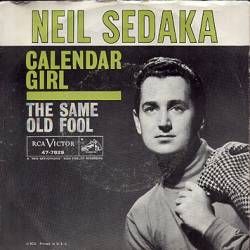
"Calendar Girl" is a song by Neil Sedaka. The music was composed by Sedaka and the lyrics by Howard Greenfield. Released in December 1960 as a single, it was a hit single for Sedaka, peaking at No. 4 on the US charts, No. 3 in Australia, and No. 1 on the Canadian and Japanese charts.
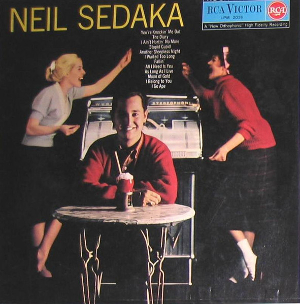
Rock with Neil Sedaka or just Neil Sedaka is the first major solo album of Neil Sedaka released in April 1959 after two 1958 albums under the titles Neil Sedaka and The Tokens and Neil Sedaka and The Tokens and Coins. The album was released by RCA Victor and was produced by Al Nevins. The album contains 12 songs, all of them co-written by Sedaka and his friend Howard Greenfield. Two of the songs became successful singles for Sedaka from the album, namely "The Diary", his debut single that was a hit, reaching No. 14 on the US Billboard charts, and "I Go Ape", a single that was relatively successful in the United States reaching No. 42, but did far better in the UK Singles Chart, making it up to No. 9 and his debut single in the United Kingdom.

Circulate is the second solo album of Neil Sedaka after his 1959 debut solo album Rock with Sedaka. Circulate was released in 1961 by RCA Victor and was produced by Al Nevins and Don Kirshner. Except for the title song "Circulate" and "I Found My World In You", the whole album contains covers of the 1930s, 1940s and 1950s songs as interpreted by Sedaka. Two of the songs were re-issued as B-sides of other hits: "I Found My World In You" was the B-side of "Sweet Little You" later in 1961, and "Circulate" was the B-side of "Alice In Wonderland" in 1963. Sedaka later recorded Italian-language versions of "Smile" and "All the Way"
The following is a comprehensive discography of Neil Sedaka, the American singer.

The Many Sides Of Neil Sedaka is a 1978 compilation album released by RCA Victor Records containing the works of pop singer Neil Sedaka. The album contains some of Sedaka's lesser-known works in the period from 1958-1965, although three of the songs on the album were charting hits at the time of their original release.
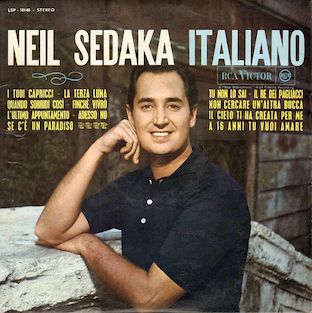
Neil Sedaka: Italiano is a 1964 compilation album containing twelve of Neil Sedaka's Italian-language recordings. It was released in Italy by RCA Victor's Italiana studios. Of the twelve songs on the album, six were recorded by Sedaka in English. A seventh song on the album, "A 16 Anni Tu Vuoi Amare", is an Italian-language version of Andrea Carroll's 1963 hit, "It Hurts To Be Sixteen".

Steppin' Out is a 1976 album containing the works of Neil Sedaka. In America it was the third and final album of a trilogy of albums issued by The Rocket Record Company. Outside America Steppin' Out was issued on the Polydor label. In 1998, the Varèse Sarabande label reissued Steppin' Out and included four bonus tracks.

"Next Door to an Angel" is a rock and pop song written by Neil Sedaka and Howard Greenfield and recorded by Neil Sedaka in 1962. It was issued by RCA Victor Records. It reached No. 5 on the Billboard Hot 100 in late 1962. "Next Door to an Angel" also went to No. 19 on the Hot R&B Singles chart. It was Sedaka's last appearance on the American Top 10 until "Laughter in the Rain" in late 1974.

"Where the Boys Are" is a song written by Neil Sedaka and Howard Greenfield for, and first recorded by, Connie Francis as the title track of the 1960 movie by the same name in which she was co-starring.

"I Can't Stay Mad at You" is a song written by Gerry Goffin and Carole King. It was originally recorded by American country artist Skeeter Davis, becoming her second top-ten hit on the Billboard Hot 100 in 1963. "I Can't Stay Mad at You" followed on the popular success of Davis' earlier 1963 crossover hit "The End of the World". The song was one of the first Goffin-King compositions to be recorded by a country music performer.

"Cc'è la luna n menzu ô mari" (Sicilian for 'There's the moon amid the sea'), mostly known in the English-speaking world as "C'è la luna mezzo mare", "Luna mezz'o mare" and other similar titles, is a comic Sicilian song with worldwide popularity, traditionally styled as a brisk 6
8 tarantella. The song portrays a mother-daughter "coming of age" exchange consisting of various comic, and sometimes sexual, innuendos. It is frequently performed at Italian-American wedding receptions and other festive occasions. Hit versions have included "Oh! Ma-Ma! (The Butcher Boy)" by Rudy Vallée and "Lazy Mary (Luna Mezzo Mare)" by Lou Monte.
